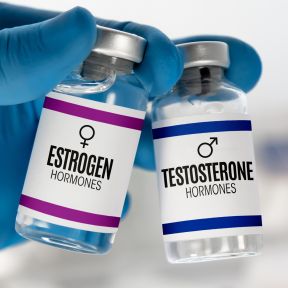
Estrogen
Estrogen hormones are female sex hormones that are primarily produced in the ovaries. Estrogen is found in both women and men (where they are thought to play a role in sperm maturation and male libido), but are produced in much higher levels in women of childbearing age.
These steroid hormones are primarily responsible for the growth and development of female sexual characteristics, regulation of the menstrual cycle, and management of the reproductive system. Scientists now understand that estrogen is vital to brain function and health, particularly as they relate to aging.
Estrogen production impacts women’s health in a variety of ways, from protection against memory loss and dementia, to management of sleep cycles, to reproductive health. American women experience menopause at an average age of 51.
Estrogen bolsters learning and memory through the hippocampus, the memory center of the brain on which estrogen and progesterone both act. The hormone also protects emotional well-being—when estrogen plummets in menopause, anxiety and depression often result. It offers neuroprotective qualities, helping the brain heal after a stroke or traumatic brain injury and guarding against degeneration that can lead to cognitive decline and dementia.
Many systems in the body are in part governed by estrogen. The hormone regulates the menstrual cycle, libido, and vaginal functioning, such as lubrication and elasticity. It helps maintain strong bones and prevents cardiovascular disease. It also contributes to the health of the urinary tract, breasts, muscles, and skin.
Estrogen plays a role in emotional well-being, and the loss of estrogen around menopause is often associated with mood swings, anxiety, and depression. Recent research found a link between a set of genes related to reproductive hormones and Premenstrual Dysphoric Disorder, a mood disorder that involves intense sadness, irritability, and anxiety before a woman’s period. A woman’s genes may therefore shape how her body responds to estrogen, and in turn, her mood.
Different lines of evidence all point to estrogen’s role in memory. When estrogen diminishes during menopause, women often struggle with brain fog and memory lapses. When menopause was temporarily induced to treat tumors, women suffered short-term memory deficits. And the transition to menopause may render women more susceptible to developing Alzheimer’s disease, showcasing the neuroprotective qualities of estrogen.
Estrogen helps promote healthy sleep by leveraging serotonin and other chemicals that contribute to falling asleep quickly, sleeping soundly, and waking fewer times in the night. While high estrogen levels are associated with strong sleep, low estrogen levels are associated with disrupted sleep. Insomnia is one of the common symptoms of menopause, a time when estrogen levels drop.
Pain intensity tends to increase when estrogen levels are low and progesterone levels are high. In fact, estrogen levels are highest during pregnancy and childbirth, which provides some natural pain relief. There’s a gender gap when it comes to pain—women have more frequent, longer-lasting, and severe pain than men—and estrogen and progesterone are involved in those differences.
Estrogen seems to have antiviral properties against numerous viruses. Research research suggests that estrogen may help dampen the flu, because cells exposed to estrogen in addition to the flu virus had a smaller viral load than cells that were not exposed to estrogen.
Men’s bodies are perceived as more attractive when women are in the fertile phase of the menstrual cycle, evidence that estrogen contributes to attraction. Yet new work calls into question research on specific aspects of attraction; for example, it seems that women are no more likely to prefer men’s faces that are more masculine than feminine at different stages of the menstrual cycle and when taking or not taking birth control pills.
During a woman's lifetime, estrogen levels will often fluctuate, rising during puberty and remaining at healthy levels until her 40s and 50s, or the beginning of menopause. At this point, estrogen production significantly drops, signaling the end of natural fertility and impacting the brain in ways that may be associated with mood changes, anxiety, depression, memory loss, and diminished neuroprotection.
Menopause, and its associated drop in estrogen production, can inflict sudden and sometimes severe health problems on women. Research shows that infusions of estrogen can treat depression and other challenges that sometimes accompany menopause. But not all menopause treatments are created equal, and it’s crucial to be able to explore and identify effective treatments.
In the years leading up to menopause, the body begins to produce less estrogen. This can lead to a range of symptoms experienced in perimenopause such as hot flashes, night sweats, lower sex drive, vaginal dryness, osteoporosis, insomnia, mood swings or depression, and impairments to memory and concentration. This is the most common time to experience low estrogen, but it can also affect young women for specific reasons such as an autoimmune condition or eating disorder.
Sometimes estrogen can become out of balance with progesterone and testosterone, such as when taking estrogen therapy. This imbalance can occasionally lead to mood swings, anxiety, headaches, insomnia, memory problems, bloating, swelling, and low sex drive, which may lead women to shift their treatment.
Options for treating low estrogen are estrogen therapy and hormone replacement therapy, which may include progesterone in addition to estrogen. Hormone replacement therapy aims to alleviate difficult symptoms of menopause—depression, insomnia, low libido, difficulty concentrating and remembering—and it can be delivered topically, orally, vaginally, or through injections.
Hormone replacement therapy was fairly common until 2002, when an NIH study, the Women’s Health Initiative, upended the field. The investigators found that hormone replacement therapy raised the risk of breast cancer, after which they stopped the study and women around the nation suddenly stopped taking estrogen.
Yet the research was flawed—most notably because the participants were primarily older women—and many have since critiqued the methodology and conclusion. In addition to alleviating the sometimes-debilitating symptoms of menopause, estrogen has protective qualities such as defending against heart attacks, osteoporosis, and dementia. The decision will be different for everyone, but many doctors believe that estrogen is not only safe but helps prevent other health problems.














